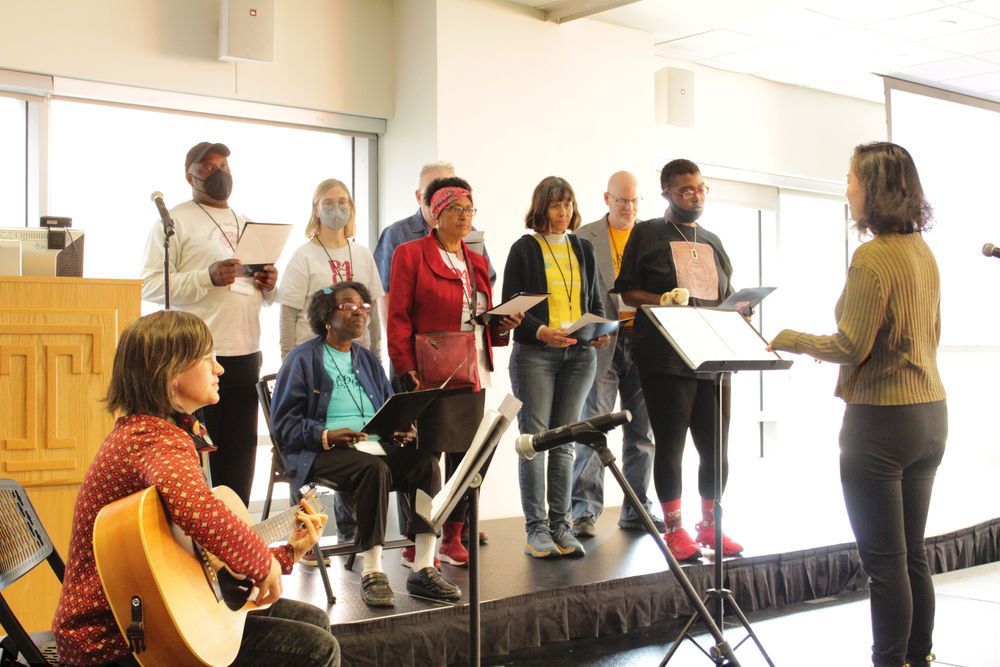
Some attendees at Temple's first Aphasia Awareness Fair in October wore t-shirts that said "Aphasia: Get the Word Out." The slogan has a double meaning.
At the daylong conference, people with aphasia, caregivers and clinicians discussed the need for better public understanding of aphasia, which sometimes is misdiagnosed and can be misunderstood in social situations. There are at least 2 million people in the U.S. with aphasia, but 84.5 % of people have never heard of it, according to a national survey. Aphasia, most often caused by a stroke, can impair a person’s ability to speak, write or process language, even though their intellect and stored knowledge of language may remain intact. Individuals may struggle to access and speak the words that they know, a problem that puts the t-shirt slogan in a more emotional context.
“When you have your stroke and you have aphasia, it can become harder to talk to friends and family,” said guest speaker Rebecca Hunting Pompon, an assistant professor from the University of Delaware’s communication sciences and disorders program, in a morning session for people with aphasia and their caregivers. “Sometimes you may feel worried, frustrated or angry. Sometimes you may feel tired or sad. Sometimes you may feel nervous, or embarrassed, or annoyed. Sometimes you may feel confused, or lost, or unsure. Aphasia is not easy. But we also know that living successfully with aphasia is very possible, and we have a lot of examples here in the room.”
The free event drew about 130 people from the Philadelphia region and beyond, including Canada and the United Kingdom. It was hosted by the College of Public Health’s Saffran Center for Cognitive Neuroscience and the Philadelphia-based Aphasia Resource Collaboration Hub (ARCH), a network formed in conjunction with Temple to promote aphasia awareness and help people discover resources.
“It’s important for people to know there is an awaiting community to receive them,” said ARCH co-founder Angelique Cauthorn, herself a stroke survivor recovering with aphasia. “You know, two million people have aphasia, but few people have heard of it. That’s a disconnect in education, a disconnect in advocacy. We’re trying to fill that gap. In this world, you're not judged by what you know, you're judged by what you can prove you know. Maybe you were once a finance manager, but now you can't tie your shoe or sign your name. People make assumptions about you or your intelligence. Aphasia affects my communication, my speaking, but it does not affect my intelligence."
In the morning session, Pompon and Reva Zimmerman, assistant professor of communication sciences and disorders at West Chester University, led the audience in what amounted to a support group session. Pompon stressed the difficult process of acceptance, part of which is remembering how much remains intact despite stroke and aphasia.
“Even though many pieces of you have changed, there are many more pieces of you that have not changed. You are still you,” she said. Speech-language pathologists and students facilitated conversations at each table in which people with aphasia connected and discussed their interests and strengths. They talked about feeling isolated, about missing the jobs they’d held as business managers or teachers or engineers, but also about resilience, recovery milestones and new activities.
In a side room, care providers, support groups and other organizations set up tables to distribute information about health and social services and opportunities to participate in research.
For the afternoon keynote, Davetrina Seles Gadson, a neuroscientist and clinical speech-language pathologist in the Department of Rehabilitation Medicine at Georgetown University, discussed “Overcoming Obstacles to Accessing Resources for Aphasia.” She offered tips for nurturing brain plasticity—the brain’s ability to rewire itself—including physical activity, art, music, writing (for those who can), puzzle solving, and staying social. She also offered guidance to people with aphasia and caregivers about working with clinicians.
“When you are working with anyone, make sure they know how you feel and what you want to do. Because as a clinician, I need to know what to do,” she said. “I firmly believe that the client doesn’t plateau, the clinician does. Your brain will continue to get better with exposure to the right things. I’ve heard people say their clinician told them ‘This is as good as it’s gonna get.’ It may be that the clinician has run out of ideas.”
A panel discussion included H. Branch Coslett, professor of neurology at the University of Pennsylvania and research neurologist at Moss Rehabilitation Hospital, who encouraged people with aphasia to consider participating in research studies, which can lead to deeper understanding and better treatments. Panelist Charles Cauthorn spoke as husband of ARCH co-founder Angelique Cauthorn—a title he prefers instead of “caregiver”—advising spouses to listen more closely than ever to the words their partners with aphasia say, and to have patience. “Make peace with slow,” he said.
“I think we took a big step toward increasing awareness of the experience of aphasia and the resources available to people. We laid the groundwork for future programs like this,” said Nadine Martin, professor in the college’s Department of Communication Sciences and Disorders and director of the Saffran Center, Temple’s home for interdisciplinary research in the neural and psychological basis of language and cognition.
The event was capped by entertainment: gospel songs from the Sounds of Joy choir and a performance by members of the Philadelphia Aphasia Community at Temple (PACT) Choir, people with aphasia who sang “What a Wonderful World,” “Ain’t No Mountain High Enough,” and “Lean On Me.”
